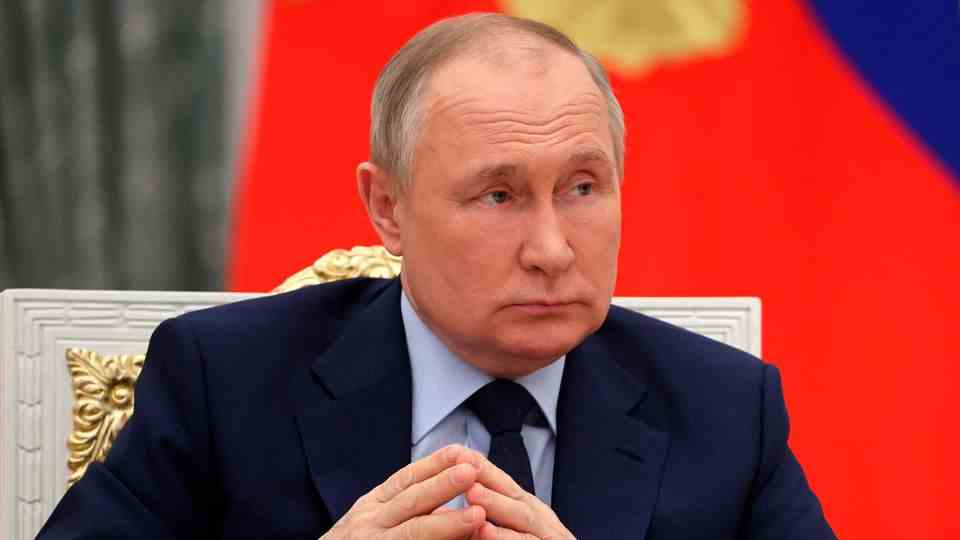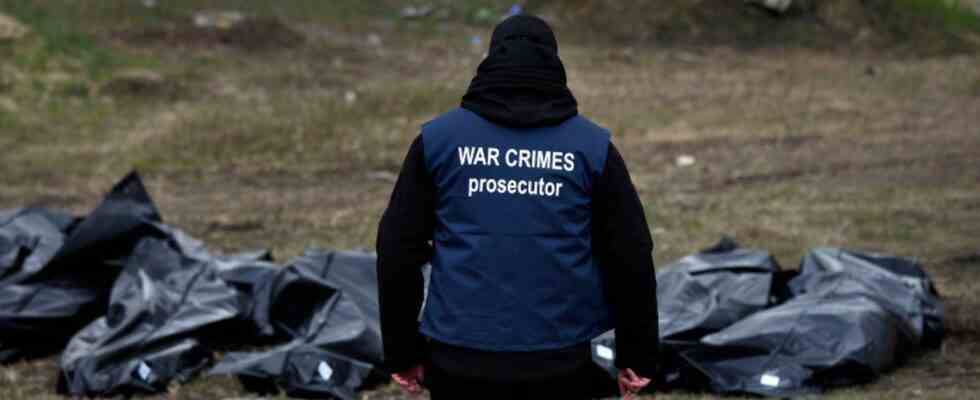Russian troops are said to have committed serious war crimes in Ukraine. Whether and who in the Kremlin will ultimately have to answer for this depends on the outcome of the war. Because winners rarely end up in the dock.
People who were shot and tied up on the side of the road, hospitals and apartment buildings that were bombed to the ground, streets completely devastated: Pictures from Bucha, Borodjanka and Mariupol went down in history. On the one hand, they symbolize the brutality of the Russian war of aggression against Ukraine. On the other hand, they should serve as evidence. As evidence that the Kremlin deliberately broke international law and either forced war crimes committed by its own soldiers or at least consciously accepted them.
Lawyers are firmly convinced that the killings in Bucha and elsewhere exceeded all bounds. “Without a doubt. That’s evident from everything we see on TV every day,” Geoffrey Nice, a former International Criminal Court lawyer, told ABC News when asked if he had any indication of Russian war crimes in the country see Ukraine. But it is questionable whether Russian decision-makers, perhaps even Kremlin boss Vladimir Putin himself, will one day have to answer for the brutality of his military.
War crimes – a question of definition
As with any criminal offence, violations of international law initially involve questions of definition. Not every attack on civilians is automatically considered a war crime under international law. In fact, according to Australian media network The Conversation, “collateral damage” is tolerated to a certain extent in war. As cruel as it is, people die in war. Civilians too.
However, as soon as intentionality comes into play, the scope for interpretation is exhausted. Unless a civilian building is also used for military purposes, an attack is a war crime. Rape, executions and torture are also clear violations. The same applies to “disproportionate” attacks – that is, when civilian losses can no longer be justified with military benefits. The use of certain weapons and ammunition can also be a war crime. In many cases, this includes fragmentation munitions or vacuum bombs, with which the attacker accepts the indiscriminate death of civilians.
International Criminal Court has been investigating Ukraine since 2014
In the case of Ukraine, at the beginning of March, one week after the start of the Russian invasion, 39 states declared the invaders’ actions potentially contrary to international law and referred the case to the International Criminal Court (ICC) in The Hague. He immediately began investigating.
However, these investigations were not the first time that the ICC had dealt with alleged (pro-)Russian war crimes in Ukraine. As early as 2020, his then chief prosecutor, Fatou Bensouda, saw “a reasonable basis for assuming” war crimes in eastern Ukraine that had occurred since the conflict began in 2014. In the end, no one was charged.
Artillery and tanks: Other NATO countries are supporting Ukraine with these weapons
12 images
Eight years later, Bensouda’s successor, Karim Khan, wants to include these “assumptions” in the new investigations. In addition to the investigations by the ICC, the UN Human Rights Council has also set up a commission of inquiry. EU Commission President von der Leyen later (after the pictures from Bucha) also announced that investigators would be sent to Ukraine.
Unclear responsibilities and authorities
However, the fact that The Hague wants to investigate the allegations presupposes that the court has jurisdiction at all. Ukraine is not a party to the Rome Statute of the International Criminal Court. However, Kyiv has twice recognized its responsibility for all violations of international law committed on Ukrainian soil. This could – in theory at least – include all war crimes committed during the Russian invasion. But not only questions of jurisdiction, but also powers make an indictment difficult. Because the ICC cannot decide whether the Russian invasion as such was unlawful at all, whether Russia can be regarded as an aggressor.
At this point the focus is on the USA. Washington does not recognize the ICC either. However, as the US think tank Council on Foreign Relations points out, the Biden government could propose that the UN set up a special tribunal. This body wielded the power that the ICC lacks to prosecute Russian decision-makers for crimes of aggression.
Now, however, Russia not only denies the allegations and accordingly refuses to cooperate. The Kremlin does not recognize the ICC, nor will it bow to any special commission of any kind. Should there be a trial, it would in all probability take place in the absence of the accused, or at least without those primarily responsible.
Sifting through thousands of pieces of evidence: investigators face a mammoth task
But there is no point worrying about responsibilities, powers and competencies until there is sufficient evidence of Russian war crimes. The investigators are faced with a mammoth task: They have to collect and evaluate thousands of photos, videos, witness statements and satellite images – while the war rages on.

In addition to official investigations by UN and EU investigators, human rights organizations such as Amnesty International are also trying to gather evidence of war crimes on the ground. “We talk to those affected and eyewitnesses, look through documents, talk to local organizations and examine the remains of weapons used,” the NGO explained at the request of the police star. In addition, the so-called “Crisis Evidence Lab” documents and verifies violations of international law remotely. Above all, videos and photos from the war zones are checked, which in turn are compared with eyewitness reports, satellite images and other public data.
The Ukrainian judiciary itself is also trying to prove war crimes committed by the Russian attackers. As the British “Guardian” writes, however, only the office of the Ukrainian Attorney General, Iryna Venediktova, has the authority to conduct investigations. However, trust in the state judicial system is limited, both at home and abroad: for years, the Office of the Attorney General had to contend with allegations of corruption.
The ICC can only judge people, not states
But even if sufficient, court-worthy evidence of Russian war crimes were collected, the International Criminal Court can only try individuals, not states. This means that the prosecution not only has to prove the violations as such beyond any doubt. Whether it’s an airstrike, execution or rape, every crime must be linked to a specific person responsible. After all, the commanders – and not least Putin himself – are responsible for the actions of their soldiers. “These rules apply to the entire chain of command and even the entire chain of command up,” Tom Dannenbaum, assistant professor of international law at Tufts University, told ABC News. This search for connections alone makes the investigations enormously complex.
As the Council on Foreign Relations wrote in a report in early April, the immense media coverage since the beginning of the war could turn out to be an advantage in court. The media documentation of the acts of war could reduce the burden of proof for the prosecutor and make it difficult for the Russian general staff to plead ignorance. The USA could also make a decisive contribution to the investigation as an information supplier. Even before the invasion began at the end of February, the US secret services had predicted Russian troop movements and strategies, some of them very precisely. By releasing more intelligence material, the Biden administration could provide investigators with crucial evidence of Russian war crimes.
Conquerors rarely end up in the dock
It will be years before an investigation can be completed and charges brought. Even if Russian decision-makers were ultimately accused of specific violations, the accused would not allow themselves to be arrested as long as they were on Russian soil. And the Kremlin will certainly not extradite anyone. The sobering truth: The ICC has convicted only 10 people in the past 20 years. “In the past, accountability under international law for injustices committed far too often fell by the wayside,” Amnesty International said star. The Russian aggression and war crimes are an “expression of increasing erosion and a lack of enforcement of the global order,” the organization continued.
As long as Putin’s cabinet is in power, charges – no matter how well documented – are only symbolic, writes the New York Times. “If those in power pretend to be immune to the laws of war, perhaps that’s because they often are.”
Destroyed houses and graves in open streets – the shocking images from Mariupol
21 images
Here’s an example: In 2010, according to the “New York Times”, the ICC launched an investigation into violent riots during elections in Kenya. 1000 people died. The Hague blamed the politician Uhuru Kenyatta for this – only he just won the elections. After he moved into the presidential palace, the ICC closed the investigation. There is no longer any way to independently verify the allegations.
This is not an isolated case. Whether in Rwanda, Myanmar, Sierra Leone or during the US invasion of Afghanistan, the past has shown that justice is one thing, reality another. Should Putin be able to sell the war in Ukraine as a victory, neither he nor anyone close to him will have to justify the atrocities at Bucha, Borodyanka or Mariupol. In the end, history is written by the winner. And they don’t end up in the dock.
Sources: “The Conversation“; “Guardians“; “New York Times“; “Council on Foreign Relations“; “ABC News“

